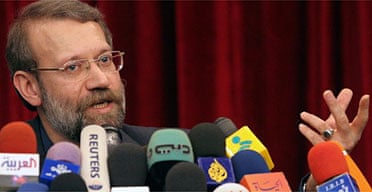The EU foreign policy chief and Iran's top negotiator are to meet for the first time since February in a fresh attempt to break the deadlock over Tehran's nuclear enrichment.
An EU official said the principle for the meeting, taking place next week, was established, adding: "It will seek to see whether we can resume negotiations."
Earlier, the Iranian ISNA news agency said Javier Solana and Ali Larijani had agreed to meet after a telephone conversation - the latest in a series of contacts since the UN security council tightened sanctions against Tehran last month.
ISNA quoted Mr Larijani as telling Mr Solana: "While Iran keeps its obvious right in developing a peaceful nuclear programme, it is always ready to have constructive negotiations with other parties.
"Based on the agreement of the two parties, the new round of Larijani's and Solana's negotiations will start on April 25."
The UN security council has set a deadline of late May for Iran to halt its uranium enrichment programme or face tougher sanctions.
After introducing limited measures in December, the security council last month stepped up the pressure, banning Iranian arms exports and freezing the assets of 28 individuals and companies involved in the country's nuclear or ballistic missile programmes.
Earlier this month, the Iranian president, Mahmoud Ahmadinejad, said Iran was capable of enriching uranium on an industrial scale - a claim greeted with scepticism by experts.
Tehran has doubled the number of operating centrifuges at its new Natanz plant in recent weeks, but has not shown it can run them non-stop for extended periods - the key to enriching enough uranium for electricity or the core of a nuclear bomb, according to analysts.
In defiance of the UN, Iran has started up more than 1,300 centrifuges in an accelerating campaign to lay a foundation for "industrial scale" enrichment involving more than 50,000, the International Atomic Energy Agency said in a leaked note this week.
Iran insists its nuclear work is for generating electricity, but the west suspects the programme is aimed at producing weapons.
The US has said it wants a diplomatic resolution to the nuclear standoff, but has not ruled out military action if that fails. It recently strengthened its military presence in the region by sending a second aircraft carrier group to the Gulf.
